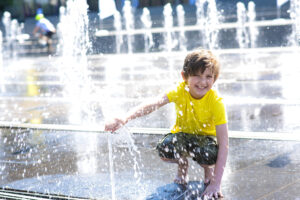
As San Diego gets ready for the 4th of July weekend, it might be time to re-visit some pointers about heat-related illnesses and why they’re not something to ignore.
Now is the time to make sure you and your children are protected for summer fun and exertion with some tips from James Baker, MD, an emergency medicine specialist at the Kaiser Permanente Baldwin Park (Calif.) Medical Center.
What is the difference between dehydration, heat exhaustion and heatstroke?
Dehydration occurs when a person’s body does not have the amount of water needed to work properly. We all lose water when we sweat and urinate, but the risk of dehydration increases when temperatures rise and when one is sick with diarrhea or vomiting.
Heat exhaustion occurs when a person’s body is unable to regulate its own temperature and the body’s temperature begins to rise. This can happen when people are working out or doing hard labor, but when temperatures rise, the overall risk of heat exhaustion increases as well. It’s important to point out that if left untreated, it can lead to heat stroke.
Heat stroke is the most serious type of heat-related illness. If a person suffering from heat stroke does not receive immediate emergency care, their life can be put at risk. With heat stroke, a person’s body is unable to cool down on its own and the body’s temperature can rise up to 106°F (41.1°C). The person suffering from heat stroke stops sweating, and therefore they are unable to cool themselves; their skin will begin to harden and lose its elasticity; the patient will begin to suffer from fever, become disoriented, and if the condition is not treated urgently, the patient can start to convulse, suffer brain damage, and even die.
Who is more susceptible to complications and why?
Children, the elderly, people living with chronic health conditions and people who take certain medications are more likely to suffer complications from a heat-related illness.
 In the case of children, their bodies adapt to drastic changes in weather more slowly. Their bodies are unable to cool down as fast as an adult. Also, kids tend to be more active and don’t think about taking breaks to cool down or drinking water to stay hydrated. If a child suffers from a chronic disease or takes medication, their risk of developing a heat-related illness is even higher.
In the case of children, their bodies adapt to drastic changes in weather more slowly. Their bodies are unable to cool down as fast as an adult. Also, kids tend to be more active and don’t think about taking breaks to cool down or drinking water to stay hydrated. If a child suffers from a chronic disease or takes medication, their risk of developing a heat-related illness is even higher.
People have a higher risk of suffering from heat-related illness if they are taking certain medications, as some may cause dehydration and others may increase the skin’s sensitivity to the sun’s UV rays. These include:
- Allergy medication, like antihistamines
- High blood pressure medication or any other heart disease medication
- Thyroid medication
- Diuretics
- Amphetamines
- Certain antidepressants or other mental health medications
Like children, the elderly have a harder time adapting to drastic weather changes. With age, you lose the ability to rapidly regulate your body’s temperature, causing the person to sweat less. Many elderly people suffer from chronic health conditions, some of which alter the way their body responds to heat. They are unable to “cool down” like younger, healthier people. Moreover, it’s very likely that elderly people are also taking medications. Equally as important is the fact that the skin of older people tends to be thinner, offering less protection against the heat and the sun’s UV rays.
[KP Tag]




